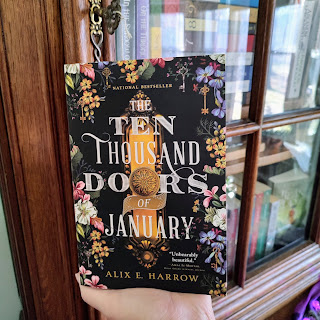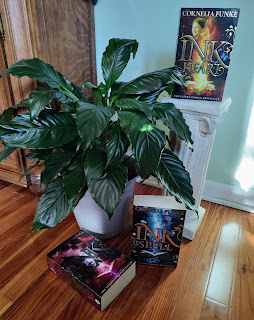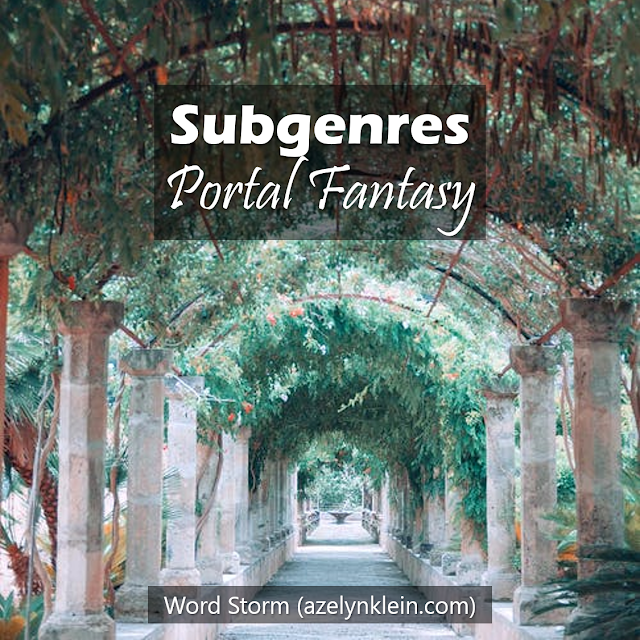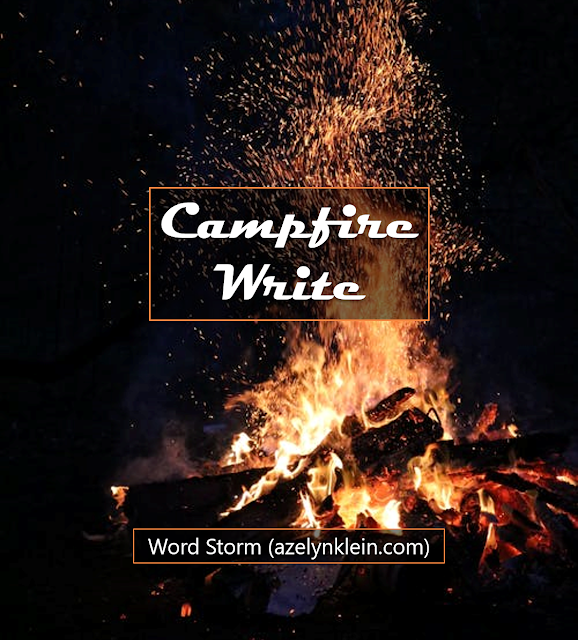Do you ever have those moments where you’re visiting in a garden and see a stone archway or maybe you’re walking in the woods and come across a peculiarly bent tree and think, “This looks like a portal to another world”? Sometimes I do.
Today, I’m picking back up with blogging with a new mini-series—subgenres! Every month for an undetermined time, I’m going to pick a subgenre and recommend a couple books. I’m going start with one of my favorites, and one of the more familiar ones—portal fantasy.
Portal fantasy: a subgenre of fantasy that features at least two different worlds. The character(s) often start in our world and travel to another world via some magical method, often a portal, which often takes the form of a door.
Coming-of-Age
Many, though not all, portal fantasy stories tend to include
some sort of coming-of-age protagonist, so it’s a great subgenre for young adult fiction. Part
of the charm of portal fantasy is experiencing the wonder of a place through
the perspective of a child.
Take C.S. Lewis’ The Chronicles of Narnia for
example. When the Pevensie children first discover Narnia, they may not want to
live there for the rest of theirs lives, but they soon come to love the talking
animals of the land. In later books though, some of the characters “age out” of
Narnia and are told it’s time to live in their own world from then on. While
this can be disheartening, it’s a part of the growing up process (or in some
cases, the re-growing up process) that the characters endure.

The Journey
Another feature includes one or more characters trying to
stay in the other world or trying to get back to ours. In this sense, portal
fantasy always features some sort of journey, from one world to another. Though
why anybody would want to leave these fantasy worlds, I don’t know. They tend
to be pretty awesome. I’ve said it before, and I’ll say it again—if I happen to
find myself in a magic realm, please leave me there. I don’t want to come back.
A lot of traveling takes place in Neil Gaiman’s Stardust,
from a tiny little town in England called Wall across the realm of Faerie and
even into the clouds where ships sail the skies. Not to mention various methods of travel from a magical candle to a unicorn to a ship to just plain
walking. It’s a weird book. I like it.
One might even put Howl’s Moving Castle by Diana
Wynne Jones in this subgenre because it features a character originally from our
world who ran away to another, and with a title like Moving Castle, yes
there’s lots of traveling. I’m talking about the book, here, not the movie.
England pops up once or twice, but it’s not the main setting. The castle also features
a portal door, which lets out in various cities. Maybe I’m stretching it.
Magical Items and/or Abilities
Portal fantasy doesn’t just feature magically transporting
from one world to another, though. It also tends to feature some sort of
magical item or ability or both. Take the Shades of Magic trilogy by
V.E. Schwab. Some of the characters have the innate magical ability to world-hop,
and some characters (sometimes the same ones) have magical items like a multi-sided
cloak or an evil rock that will corrupt the heart of an entire realm.
The term world-hopping makes me think of Brandon Sanderson’s
Cosmere books, but they don’t feature our world, so it’s not exactly
portal fantasy… Oh, well.
Various Quests


One might also argue that multi-verse stories could be
portal fantasy, but I’m not actually a fan of most multi-verse stories or the
multi-verse theory, so I’m going to leave those books alone for now.
Thanks for reading!
Let’s chat! What are some of your favorite portal fantasy
novels? Have you read any that I listed? Are there any others that you’d
recommend?
***
Similar posts: 7 Sci-Fi/Fantasy Book-to-Movie Adaptations I Enjoy, 8 Popular Fantasy Novels I Enjoy, 7 Reasons I Enjoy Fantasy Novels



